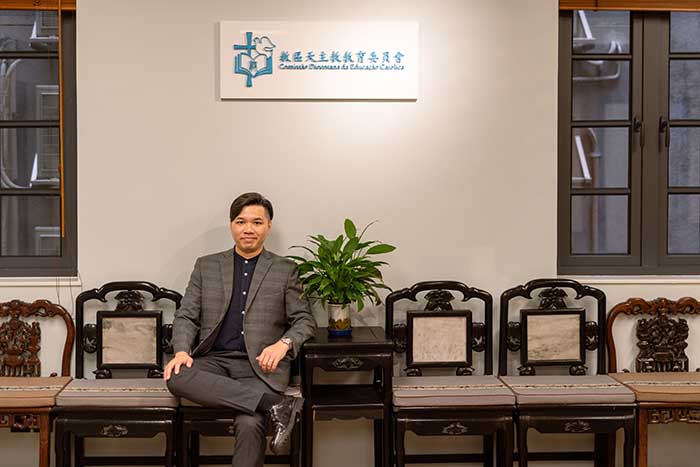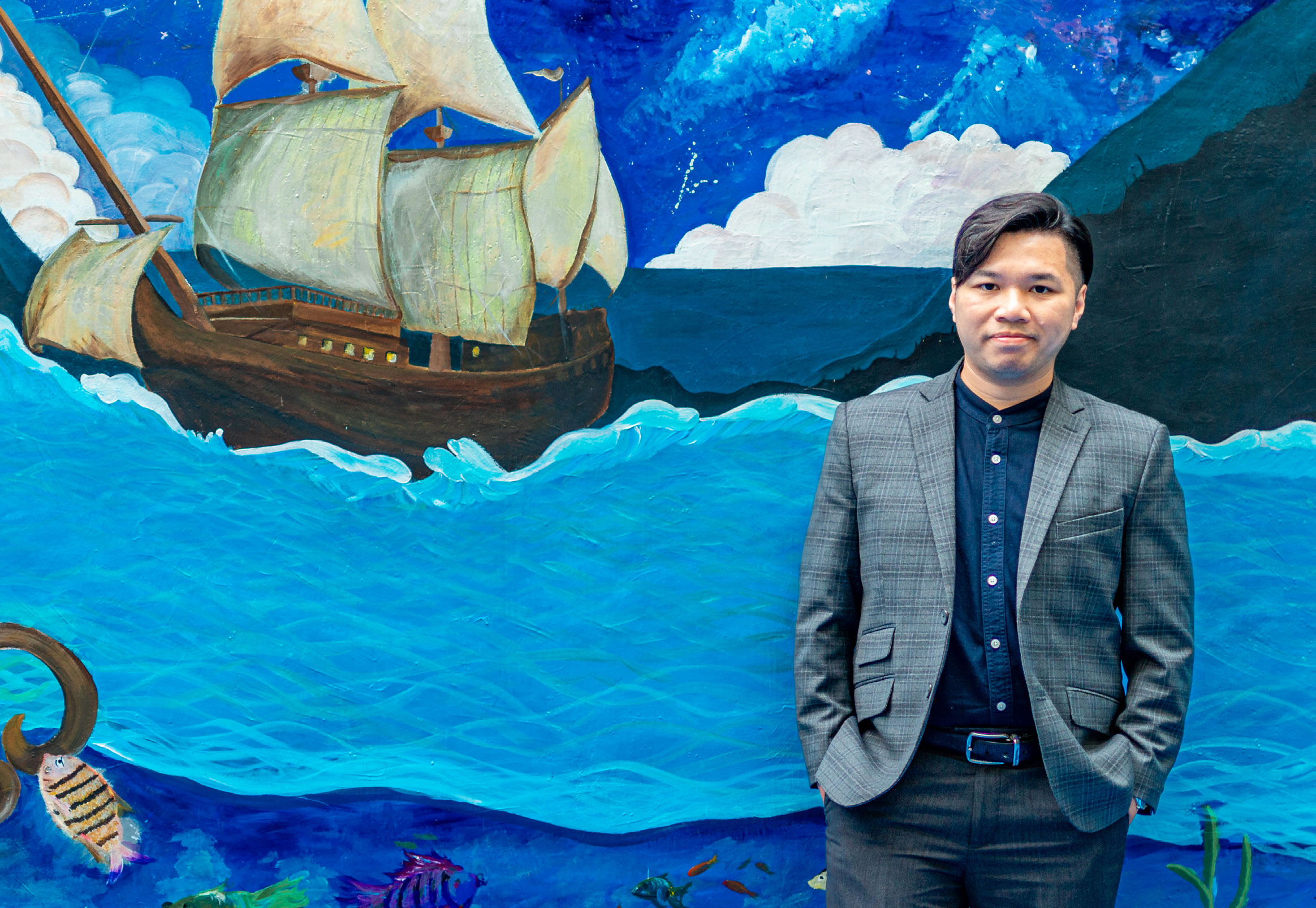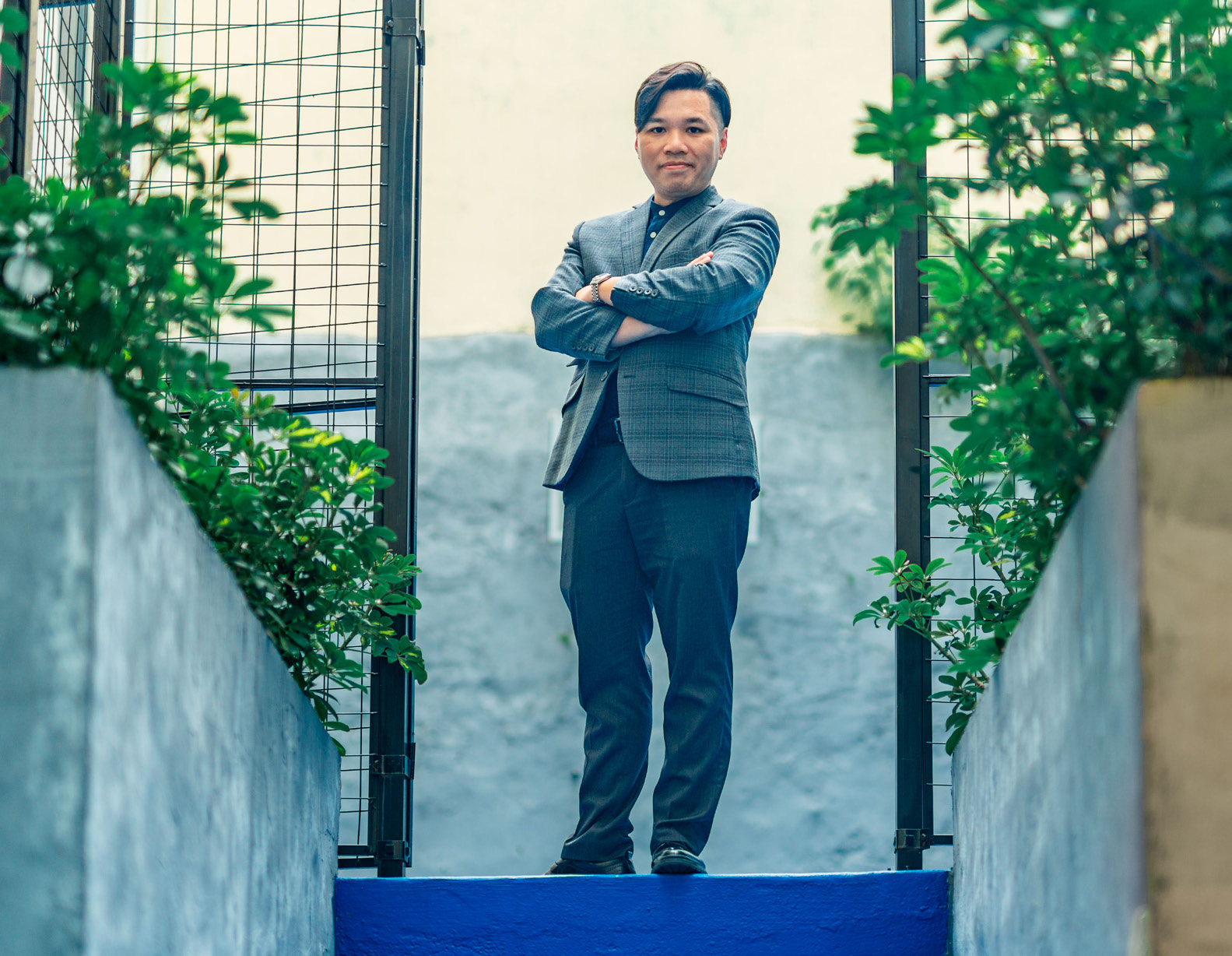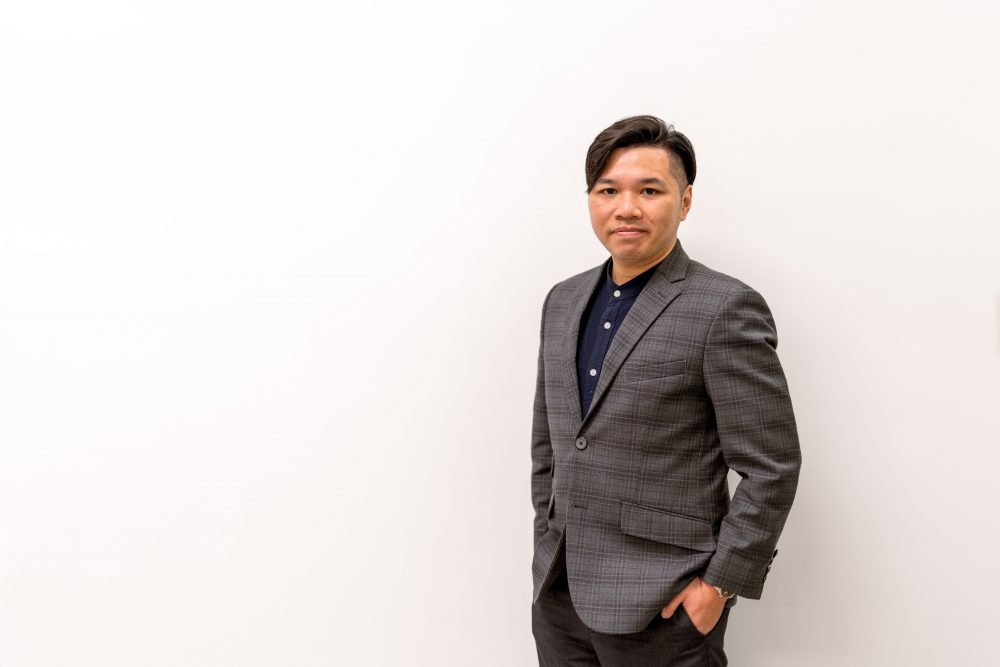An interview by Sr. Marco Carvalho
「天主教學校透過校園生活,讓學生見證天主的臨在」
專訪教區天主教教育委員會辦事處主任陳庭鋒 (天主教週報「號角報」 2023年9月22日報導) - ![]() 下載PDF版本
下載PDF版本
在澳門40多間學校裡,天主教學校佔過半數。澳門天主教教育委員會辦事處陳庭鋒主任早前接受號角報葡文版專訪時,談到天主教學校在過去幾年的收生人數持續增長。他稱,這與天主教學校的價值觀和使命有關,即使當中面臨不同的挑戰。
天主教學校是澳門教育其中重要組成的部份,這是無可否認的。但天主教學校與其他學校或辦學團體有何不同?
我們與非天主教學校最大的不同,就是我們的校園生活是讓學生見證天主的臨在,尤其在價值觀的教育方面,我們會依照基督的信仰為基礎去培育學生,使他們了解及學習天主教信仰的價值觀及德行,並使其成為他們待人處世的態度。
一般來說,在天主教學校讀書的學生中,只有一小部分是天主教徒。要向沒有天主教背景的兒童及青少年傳達天主教的價值觀與理念,您認為有何挑戰性?
挑戰當然是有的,但作為天主教學校的辦學者,我們相信一切都是天主的安排。祂給予我們這一批學生,是相信我們有能力讓他們認識天主,而大部份天主教學校都是「一條龍」學校,即同時開設幼兒、小學及中學教育,我們從小讓他們感受祈禱生活,參與彌撒,並以符合他們教育階段的教學方法教授「宗教科」,在實際工作中,並沒有太大的困難,因為他們都視之為學校生活一部分,另外,始終校園生活不同於堂區的教友培育,所以學生經過幾年學習,都基本掌握到天主教的價值觀。
在一個充滿競爭的社會中,您認為天主教學校的主要使命是甚麼?
天主教學校最大的使命,就是讓他們學懂在做人處世時,是以「善」作為做抉擇時的基礎,如果社會大部分的人都具備這一個特質,相信社會就會不停進步,亦可以讓眾人「免於兇惡」。
若我沒有理解錯誤,現時澳門一共有26所天主教學校。總括而言,每個學年會有多少學生入學?收生人數在過去幾年是增加還是減少?
雖然我們還沒有最新學年(2023至2024年)的數據,但根據以往的資料顯示,天主教學校的收生人數持續上升。具體而言,在教育及青年發展局登記的41所校園中,26間天主教學校的學生人數一直有攀升趨勢。在上個學年(2022至2023年),這些學校的學生人數為31,004人,而澳門的非高等教育學生總數為87,184人。這相比再對上個學年(2021至2022年)的30,403名學生增加了1.98%。值得注意的是,這數字與2020至2021學年的29,836名學生也增長了1.90%,與2019至2020學年的29,079名學生也增長了2.60%;顯示天主教學校的入學率處於持續上升的趨勢。
在9月8日舉行的教師發展日中,46名教師獲嘉許。要找到與天主教價值觀吻合的教師和專業人士容易嗎?又或說,聘用和留用能夠加強天主教學校身份定位與使命的教師,是一件困難的事嗎?
我相信絕大部份的老師都是專業及具備師德的,在他們入職前,我們都會坦誠地告知他們學校是一所天主教學校,並需要傳遞天主教價值觀的,他們都是知道學校的立場與原則。在這前提下,我們不難聘請認識天主教價值觀的老師,而其中一個原因,或許是因為有不少老師畢業於天主教學校,所以他們都是認同學校的辦學核心價值的。至於能夠加強天主教學校的身份和使命的教師方面,這是在乎於學校領導者有沒有給予他們更多認識天主教信仰及價值的機會,並主動向他們作出介紹與培育。這幾年,有感慕道與領洗的現職教師正在增加,這亦是一個好現象。
在日新月異的澳門,您認為天主教學校面臨最大的挑戰是甚麼?
我相信現今挑戰不是單單在於天主教學校需要面對,其實是整個教育界需要面對的,首先,家庭的形態與以往相比有較大的不同,雙職家庭、單親家庭,間接先學生缺乏(或比以往少)父母的支援與陪伴,他們的心靈需要是學校值得更為關注的,但天主教學校的信仰生活反而成為一項優勢,因為藉著信仰的力量,可以教導學生對生命要有盼望,就算遇到困難及不安,嘗試交託給天主,讓學生感受主內的平安。
在天主教學校內如何實踐國民教育呢?
澳門回歸已有24年,在課程上,天主教學校與其他學校一樣使用《品德與公民》課本,校內亦會教導學生升國旗,唱國歌,澳門天主教學校在法規中是一所在澳門特區中開辦的私立學校,所以我們是有責任推動愛國教育的。
您也是聖若瑟教區中學校董會成員之一,而聖中二校更新開展以英文為主的中學課程;這是澳門天主教學校的一個新嘗試。在這新一年裡,聖中二校一共招收了多少學生?
能開設英文中學部,是有賴各方的努力,亦要感謝教青局的支持及協助,這個學部都開設兩班,合共約48人,共中一半是原校的小六學生,其餘的一半是其他學校的新生,而新生中絕大部份都是就讀其他天主教學校的。
在新的學年裡,您認為聖中二校將面臨哪些挑戰?
因為是新的學部、新的學生及新的校舍,就觀察這兩周運作,大致是順利的,現在教師著手讓來自不同學校的學生融合。另外,因為是英文部學校,建立外語溝通的氛圍是學校的重要指標,但新生中有不少是就讀中文部小學的,教師會多鼓勵他們多說、多講,相信一段時間過後,學生會漸漸適應的。
最後,澳門教區計劃如何加強本地天主教學校的特質和使命?未來會否有相關的改革或改善計劃?
計劃是有的,澳門教區直屬學校的校董會在幾年前開始進一步改革,在李斌生主教的帶領下,邀請了很多熟悉教育發展的專業人士進入校董會。同時,在政府未強制規定前,已增加家庭校董及教師校董,這是一個學校民主化的體現,讓更多有能力的人士為學校發展建言,但過程中,我們是給予他們培育的,使他們掌握天主教的核心價值及天主教辦學特色。這十分重要,因為這樣能確保學校的發展策略與方針遵循天主教的信仰為核心,由頂層領導開始,做好這個工作。另外,值得一提的是,李主教本年度走訪所有教區學校,主講有關身體神學的課程與講座,另外還有幾所修會學校,為所有教學人員講授天主教會對性別議題的觀點。未來,我們將會每年推出一些給予所有教學人員的講座,向他們介紹天主教對社會不同議題的立場及觀點,以強化天主教學校的特色和使命的發展。
"Transmissão dos valores cristãos é o que nos distingue"
STEPHEN CHAN, DIRECTOR DA COMISSÃO DIOCESANA DA EDUCAÇÃO CATÓLICA
(Jornal O Clarim - Semanário Católico de Macau 15 de Setembro de 2023) - ![]() Para obter em PDF
Para obter em PDF
As 26 escolas católicas de Macau são cada vez mais procuradas pelos alunos do território. Quem o diz é Stephen Chan, que em entrevista a’O CLARIMfala de um crescimento sustentado, ao longo dos últimos anos, do número de alunos matriculados nos estabelecimentos de Ensino de matriz católica. Uma realidade que segundo o director da Comissão Diocesana da Educação Católica está relacionada com os valores e a missão deste tipo de Ensino, havendo sempre desafios a superar.
As escolas católicas são, inegavelmente, uma parte importante da paisagem educativa de Macau. O que diferencia as escolas católicas dos outros estabelecimentos de Ensino?
A maior diferença entre as nossas escolas e as escolas não-católicas é que o trabalho que desenvolvemos foi projectado para permitir que os alunos testemunhem a presença de Deus, em particular no que toca à questão da transmissão de valores. Nós desenvolvemos os nossos alunos tendo por base a fé de Cristo, ajudando-os a compreender e a desenvolver os valores e virtudes da fé católica, e oferecendo-lhes a possibilidade de adoptar estas atitudes nas interacções com os outros.
Ainda assim, apenas uma fracção dos alunos professa o Catolicismo. Como é que se transmitem valores e atitudes católicas a crianças e a jovens com pouco ou nenhum conhecimento da fé de Cristo?
Na qualidade de professores e de educadores nas escolas católicas, depositamos a nossa fé nos desígnios de Deus, mesmo quando os desafios se manifestam. Ele confiou-nos estes alunos porque acreditamos que temos a capacidade para os ajudar a conhecer Deus. A maior parte das escolas católicas oferece uma educação abrangente, que abarca a educação Pré-escolar, o Ensino Primário e o Ensino Secundário. Começamos desde cedo a ajudar os estudantes a enveredar por uma vida de oração, a participar na Missa e a transmitir ensinamentos religiosos através de métodos adequados à idade. Na prática, não há dificuldades muito significativas porque estes aspectos estão integrados na própria vivência quotidiana que a escola lhes oferece. Além disso, a vida escolar é diferente das estratégias de fomento da fé desenvolvidas pelas paróquias. Ao fim de vários anos de estudo, os alunos, em regra geral, alcançam uma boa compreensão dos valores centrais da fé católica.
Numa sociedade cada vez mais competitiva, qual diria que é a principal missão das escolas católicas?
A nossa principal missão é ajudar os alunos a compreender que a benevolência é o aspecto que deve fundamentar as suas decisões nas interacções que mantêm e vão manter com os outros ao longo da vida. Nós acreditamos que se a maior parte da sociedade abraçar este modo de procedimento estarão reunidas as condições para um desenvolvimento social continuado. A benevolência serve de salvaguarda contra o mal.
Quantos alunos estão inscritos nas escolas católicas no ano lectivo que arrancou no início do mês? Este número tem vindo a aumentar ou a diminuir ao longo dos últimos anos?
Apesar de ainda não termos os números relativos ao ano lectivo de 2023/2024, a tendência ao longo dos últimos anos sugere um crescimento sustentado no número de estudantes inscritos. Em termos específicos, as 41 secções e instalações das 26 escolas católicas registadas junto da Direcção dos Serviços de Educação e de Desenvolvimento da Juventude têm demonstrado consistentemente uma trajectória ascendente. No ano lectivo de 2022/2023, as escolas católicas contavam com 31 mil e quatro alunos inscritos, de um total de 87 mil 184 estudantes que frequentavam o Ensino não terciário em Macau. A cifra representa um aumento de 1,98 por cento face aos 30 mil 403 alunos inscritos nas escolas católicas no ano lectivo de 2021/2022. Notavelmente, esse número também aumentou em 1,90 por cento face aos 29 mil 836 inscritos em 2020/2021, valor que, por sua vez, esconde um aumento de 2,60 por cento face aos 29 mil e 79 alunos que frequentavam as escolas católicas no ano lectivo de 2019/2020.
É fácil encontrar professores e outros profissionais familiarizados com os valores católicos? Ou recrutar professores com estas características constitui um desafio para as escolas?
Acredito que na sua grande maioria os professores sejam bons profissionais, com princípios éticos bem definidos. Antes de se juntarem a nós e às nossas escolas, somos totalmente transparentes com eles, na medida em que os informamos que as nossas escolas são escolas católicas e colocam uma ênfase muito particular na transmissão dos valores católicos. Tendo em conta este procedimento, não é muito difícil contratar professores cientes do que são valores católicos. Uma eventual razão para isto pode prender-se com o facto de muitos dos nossos professores terem frequentado escolas católicas e identificarem-se com os valores-chave da nossa escola. Já no que toca ao reforço da identidade e da missão das escolas católicas, depende sobretudo se os responsáveis pelas escolas oferecem ou não aos professores oportunidades para aprofundar a compreensão da fé e dos valores católicos. Também depende da vontade dos professores em envolverem-se activamente neste processo. Ao longo dos últimos anos, temos testemunhado um aumento no número de professores interessados em aprender sobre a fé católica e a submeterem-se ao Baptismo, o que é algo de muito positivo.
Numa Macau em constante mudança, quais diria que são os grandes desafios com que as escolas católicas se deparam?
Acredito que os desafios que enfrentámos não são exclusivos das escolas católicas, mas são desafios que todo o sector educativo tem que enfrentar. Mudanças nas estruturas familiares, com a generalização das famílias de rendimento duplo ou das famílias monoparentais, pode conduzir a situações em que os alunos não recebem apoio e acompanhamento dos pais. A dimensão emocional destas crianças é algo a que as escolas devem prestar uma maior atenção. No entanto, a vivência da fé nas escolas católicas pode ser uma vantagem, porque pode ensinar os estudantes a manter a esperança ao longo da vida através do poder da fé, mesmo quando encontram dificuldades ou se deparam com ansiedade.
De que forma a diocese de Macau tenciona reforçar a identidade e a missão das escolas católicas? Há reformas significativas em curso ou a ser preparadas?
As escolas diocesanas de Macau empreenderam há alguns anos um plano de reforma, sob a égide do bispo D. Stephen Lee. Convidaram pedagogos e especialistas em educação para se juntarem ao Conselho de Administração e nós sugerimos o envolvimento de representantes dos pais e dos professores nos conselhos directivos das escolas antes mesmo do Governo tornar isso obrigatório. Durante o processo facultamos alguma preparação para que tenham noção dos valores católicos fundamentais e das características que distinguem a educação católica. Para além disso, o bispo D. Stephen Lee visitou este ano todas as escolas diocesanas, bem como várias outras escolas católicas, onde proferiu a palestra “A Resposta do Vaticano à Teoria de Género: Homem e Mulher, Ele os Criou”, tendo oferecido a perspectiva da Igreja Católica sobre as questões de género. Planeamos organizar no futuro palestras anuais destinadas aos professores. Tudo para reforçar o desenvolvimento das características e da missão das escolas católicas.
“We cultivate students based on the faith of Christ”
Stephan Chan, Managing Director of the Diocesan Catholic Education Commission
(O Clarim - Macao Catholic Weekly, from the 22 September 2023 issue)
Catholic schools are undeniably a very important part of the educational landscape of Macau. What sets Catholics schools apart from the other educational institutions?
The biggest difference between non-Catholic schools and us is that our campus life is designed to allow students to witness the presence of God, particularly in the aspect of values education. We cultivate students based on the faith of Christ, helping them to understand and learn the values and virtues of the Catholic faith, thus enabling them to adopt these attitudes in their interactions with the others.
Generally speaking, only a fraction of the students currently enrolled at Catholic schools are Catholics. How challenging it is to convey Catholic values and attitudes to children and youngsters with little or no knowledge of the faith?
In our role of educators in a Catholic school, we have faith in God’s plan, even when challenges arise. He has entrusted these students to us because we believe we have the ability to help them come to know God. Most Catholic schools offer a comprehensive education, spanning kindergarten, primary and secondary levels. We start early in helping students experience a prayerful life, participate in Mass and teach religious studies using age-appropriate methods. In practical terms, there aren’t significant difficulties because these aspects are integrated into their school experience. Furthermore, campus life is distinct from parish-based faith nurturing, so after a few years studying with us, students generally grasp the values of the Catholic faith.
In an increasingly competitive society, what would you say the main mission of Catholic schools should be?
Our greatest mission is to help students understand that “goodness” should be the foundation of their decisions in their interactions with the others, throughout their life. We believe that, if the majority of society embraces this quality, it will pave the way for ongoing societal advancement and serve as a safeguard to “deliver us from evil”.
There are currently 26 Catholic schools in Macau. Overall, how many students will be enrolled in these schools in the new academic year that started earlier this month? Did this number increase or decrease over the last few years?
While we do not yet have the figures for the 2023/2024 school year, historical trends suggest a continued growth in student enrolment. Specifically, the 26 Catholic schools registered under 41 sections or campuses with the DSEDJ (Education and Youth Development Bureau) have consistently demonstrated an upward trajectory. In the 2022/2023 school year, these schools accounted for 31,004 students out of a total of 87,184 non-tertiary students in Macau. This represented a 1.98 per cent increase from the 30,403 students registered in the 2021/2022 academic year. Notably, that figure had also grown by 1.90 per cent from the 29,836 students registered in 2020/2021, which itself marked a 2.60 per cent rise from the 29,079 students in the 2019/2020 school year.
Forty teachers were commended for their services to Catholic education earlier this month. Is it easy to find teachers and professionals well versed in Catholic values? Or is hiring and maintaining teachers, who are able to strengthen the identity and mission of Catholics schools, increasingly difficult?
I believe that the vast majority of teachers are both: professional as well as possess ethical standards. Before they join our schools, we are transparent in informing them that our school is a Catholic school dedicated to transmitting Catholic values. They are aware of the school’s stance and principles. With this foundation, it isn’t challenging to hire teachers who understand Catholic values. One possible reason for this might be that many of our teachers graduated from Catholic schools, and they identify with our core values and our beliefs. As for the aspect of strengthening the identity and mission of Catholic schools, it depends on whether school leaders provide opportunities for teachers to deepen their understanding of the Catholic faith and values. It also depends on teachers’ willingness to actively engage in this process. In recent years, we have seen an increase in the number of teachers who are interested in learning about Catholic faith and receiving baptism, which is a positive development.
In an ever-changing Macau, what would you say are the biggest challenges that the Catholic schools face?
I believe the challenges we face today are not unique to Catholic schools. They are challenges that the entire education sector must face. Changes in family structures, such as dual-income and single parent households may result in students with lacking parental support and companionship. Their emotional side is something that schools should pay closer attention to. However, the way faith is fostered in Catholic schools can be an advantage because it can teach students to have hope in life through the power of faith. Even when they face difficulties and anxieties, they can learn to entrust them to God, allowing students to experience inner peace through their faith.
How is patriotic education being implemented in Macau’s Catholic schools?
The return of Macau to Chinese sovereignty took place 24 years ago. In terms of the curriculum, Catholic schools are like other schools: they make use of the “Moral and Civic Education” textbook. Schools also teach students to raise the national flag and sing the National Anthem. Catholic schools in Macau are private schools operating in the Macau S.A.R. under the law, so we have a responsibility to promote patriotic education.
You are also supervisor at the Colégio Diocesano de São José, which has launched a new English-language college. CDSJ 2 represents a new venture in terms of Catholic Education in Macau. How many students did the school manage to attract in this first year?
The establishment of a new English section relies on the efforts of various parties and we would like to express our gratitude for the support and assistance from DSEDJ. The English section has two classes with about 48 students at the moment, half of them former sixth-grade students from our school. The other half are new students, mostly from other Catholic schools.
What are the challenges that the school expects to face in the coming months?
As it is a new section with new students and a new campus, the past weeks have been relatively running smoothly: the teachers are working on integrating students from various schools currently. Additionally, since it’s an English-based school, creating an atmosphere of foreign language communication is a key focus. However, many new students previously attended Chinese-based primary schools. Teachers are working hard to encourage them to speak more in English, and we believe that with time, the students will gradually adapt to this environment.
Lastly, how is the Diocese of Macau planning to strengthen the identity and mission of local Catholic schools? Are there any relevant reforms being planned?
Macau Diocesan Schools began a reform plan a few years ago under Bishop Lee. They invited education experts to join the board of directors, we invited the involvement of parent and teacher representatives on the board, even before it was mandated by the government, showing the democratization of the school and allowing more capable individuals to contribute to the development of the school. During the process, we provided them training with Catholic core values and the distinctive characteristics of Catholic education. This is crucial to ensure that the school’s development strategies and policies are rooted in the core beliefs of Catholicism, starting from the top leadership. Additionally, Bishop Lee visited all Diocesan schools and several Catholic schools this year, delivering lectures on “The Vatican Responds to Gender Theory: Male and Female He Created Them”, providing, thus, the perspective of the Catholic Church in gender issues. In the future, we plan to organize annual lectures for all teaching staff, introducing them to the Catholic Church’s positions and perspectives on various societal issues to strengthen the development of Catholic school characteristics and missions.




